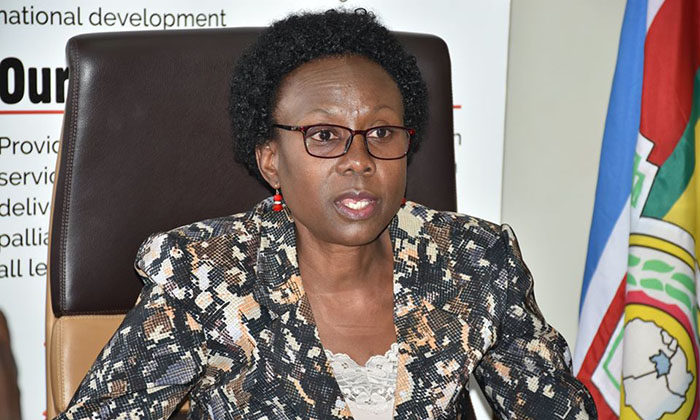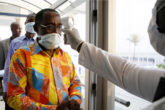
The Minister of Health in Uganda, Dr. Jane Ruth Aceng. COURTESY PHOTO.
The Ministry of Health (MoH) has issued new recommendations for Churches on procedures for prayer meetings in light of the spread of Coronavirus (COVID-19) across the globe.
In a statement, MoH stated that mass gatherings including prayer congregations and crusades can increase the risk of transition of infectious diseases such as Coronavirus, which is currently affecting 117 countries and territories around the world.
“Organizers must take adequate preparations before hosting an event to protect the participants,” the ministry said.
Adding, “A team from the Ministry of Health or local health authority should inspect the location, review preparations and conduct a risk assessment. The organizers should designate a competent person to liaise with the health authorities during the organisation of the event.”
MoH said churchgoers should consider their own health including any potential to infect others with a contagious disease before attending services.
In his submission, the President Yoweri K. Museveni noted that the country has no suspected or confirmed case of coronavirus and “we still can avoid it,” he added.
Safety recommendations are listed below;
- Ensure provision of adequate hand washing facilities with soap or alcohol-based hand rub.
- People with flu like symptoms and who are unwell should stay at home in a well-ventilated room and should not be allowed to access premises of the gathering.
- Organizers should plan for cleaning and disinfecting frequently used communal places like bathrooms, toilet surfaces and frequently touched surfaces such as doorknobs /handles, car doors and elevator buttons with disinfectant or soap.
- Organizers should provide adequate waste management facilities (bins, cans and single use tissues) and properly protected /trained waste handlers.
- Provide information on prevention of COVID-19 to participants on the following;
- If you notice someone who is coughing or sneezing maintain at least 2 meters from them.
- Discourage handshakes and hugging at all times.
- Cover mouth and nose with tissue or a handkerchief when coughing and sneezing. The handkerchief must be washed and ironed. In case of use of disposable tissue, ensure to dispose it off in a designated area or dust bin immediately after use, in this way, you protect others from any virus released through cough and sneezes.
- Organizers must advise anyone with fever, cough and difficulty in breathing to avoid/leave the gathering immediately and seek medical attention.
- Avoid touching your eyes, nose and mouth. Hands touch many surfaces which can be contaminated with the virus and you can transfer the virus from the surface to you.
- Advise participants against spitting in public.
- If you suspect any particular person to have COVID-19, immediately inform health workers and alert them about the situation.
Coronavirus (CoVid-19) is a respiratory illness that causes flu-like symptoms. As of March 10, 2020, more than 113,000 people were infected globally and 4,000 reported dead, according to CNN’s tally.
All 60 million residents in Italy are under restrictions/lock down, including travel checks, school closures and bans on public events.
In South Korea, a staggering two-thirds of the more than 4,000 people who have now tested positive for coronavirus are tied to the same church, CBS News reported.
That aside, Christian Today reported on Tuesday that a pastor of a historic Georgetown Episcopal Church in Washington D.C. in the United Sates became the first confirmed case of coronavirus in the district, and in an alarming development, officials revealed that the same church leader shook the hands of hundreds of worshippers during recent services.
Several churches across the globe have suspended services, encouraging believers to attend prayers online.
Others have stopped or developed standard safe procedure for holy communion, and are providing hand sanitizer, as well as letting parishioners know it is ok to avoid physical contact during signs of peace.

